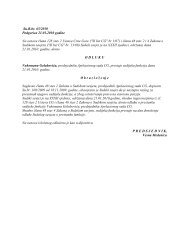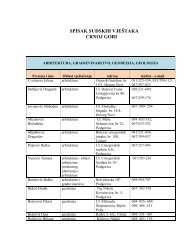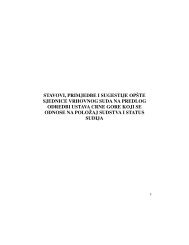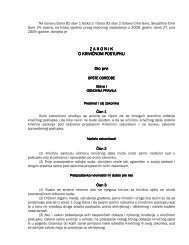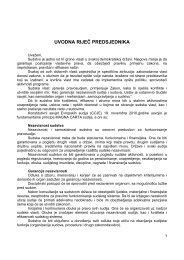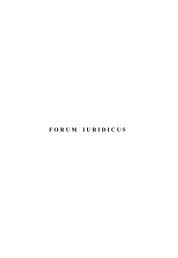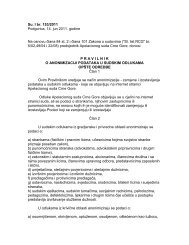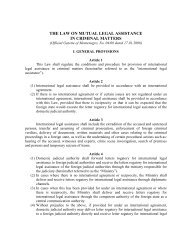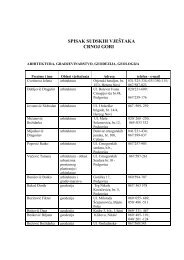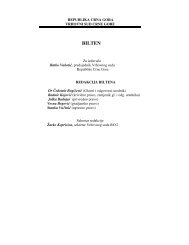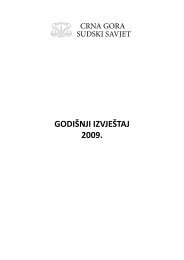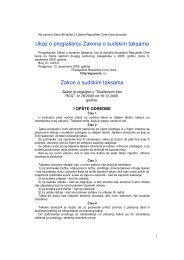LAW ON CRIMINAL LIABILITY OF LEGAL ENTITIES
LAW ON CRIMINAL LIABILITY OF LEGAL ENTITIES
LAW ON CRIMINAL LIABILITY OF LEGAL ENTITIES
You also want an ePaper? Increase the reach of your titles
YUMPU automatically turns print PDFs into web optimized ePapers that Google loves.
<strong>LAW</strong> <strong>ON</strong> <strong>CRIMINAL</strong> <strong>LIABILITY</strong> <strong>OF</strong> <strong>LEGAL</strong> <strong>ENTITIES</strong><br />
(Published in the “Official Gazette of the Republic of Montenegro”,<br />
Nos. 2/2007 and 13/2007)<br />
I. BASIC PROVISI<strong>ON</strong>S<br />
Subject Matter of the Law<br />
Article 1<br />
This Law shall govern the conditions of criminal liability of legal entities,<br />
criminal sanctions applied against legal entities, and criminal procedure in which<br />
such sanctions are imposed.<br />
Exclusion and Limitation of Liability<br />
Article 2<br />
(1) The Republic of Montenegro (hereinafter referred to as<br />
“Montenegro”) state authorities and local government authorities may not be liable<br />
for a criminal offence.<br />
(2) Legal entity vested with public powers shall not be liable for a<br />
criminal offence committed in the performance of such powers.<br />
Criminal Offences for Which Legal Entities are Liable<br />
Article 3<br />
Legal entities may be held liable for criminal offences referred to in the<br />
special section of the Criminal Code and for other criminal offences provided for<br />
under a separate law, if the conditions of liability of a legal entity prescribed by<br />
this Law have been fulfilled.<br />
Definitions<br />
The terms used in this Law shall have the following meanings:<br />
1) legal entity means a company, foreign company and foreign company<br />
branch, public enterprise, public institution, domestic and foreign nongovernmental<br />
organizations, investment fund, other fund (except for the fund<br />
exercising solely public powers), sports organization, political party, as well as
other association or organization which continuously or occasionally gains or<br />
acquires assets and disposes with them within the framework of their operations;<br />
2) responsible person means a natural person entrusted with certain<br />
duties in a legal entity, a person authorized to act on behalf of the legal entity and<br />
a person who can be reasonably assumed to be authorized to act on behalf of the<br />
legal entity. A natural person acting on behalf of the legal entity as a shareholder<br />
shall also be considered to be a responsible person;<br />
3) effective, necessary and reasonable measures mean those measures<br />
which the legal entity has undertaken with the aim to reveal and prevent criminal<br />
offences and encourage the employees to act in accordance with the law, other<br />
regulations and good business customs by which that aim is realized, and in<br />
particular:<br />
- adoption of standards and procedures with the aim to reveal and prevent<br />
criminal offences;<br />
- adoption of the programme for implementation of the standards and<br />
procedures referred to in indent 1 above, including the provision of necessary<br />
financial and other resources, as well as the obligation of certain persons in the<br />
legal entity to monitor constantly the implementation of those standards and<br />
procedures and to report periodically thereof to the superior officer in the legal<br />
entity and to the management bodies;<br />
- carrying out supervision with respect to the application of the standards<br />
and procedures referred to in indent 1 above by the management bodies;<br />
- prohibition to perform the management function to each person who is<br />
reasonably suspected of carrying out illegal actions;<br />
- implementation of an effective programme of training of responsible<br />
persons on the standards and procedures referred to in indent 1 above;<br />
- undertaking appropriate actions for the implementation of the standards<br />
and procedures referred to in indent 1 above by all employees, such as periodical<br />
assessments of effectiveness, providing guidelines with the aim of avoiding<br />
perpetration of criminal offences, establishing mechanisms for anonymous and<br />
confidential reporting of criminal offences, monitoring the application of the<br />
standards and procedures, control of business books and other documents;<br />
- conducting disciplinary proceedings for violations of the standards and<br />
procedures referred to in indent 1 above, as well as giving rewards for consistent<br />
application of those standards and procedures;<br />
- undertaking adequate measures after the criminal offence is revealed,<br />
including conducting full internal investigation and, if necessary, changing the<br />
programme referred to in indent 2 above so as to prevent future criminal offences.<br />
II. GENERAL PROVISI<strong>ON</strong>S<br />
1. Conditions for Liability of a Legal Entity<br />
for a Criminal Offence<br />
2
Grounds for Liability of a Legal Entity<br />
Article 5<br />
A legal entity shall be liable for a criminal offence of a responsible person<br />
who acted within his/her authorities on behalf of the legal entity with the intention<br />
to obtain any gain for the legal entity.<br />
Limits of Liability of Legal Entity for Criminal Offences<br />
Article 6<br />
(1) Under the conditions referred to in Article 5 above, the legal entity<br />
shall be held liable for a criminal offence even if the responsible person who<br />
committed such criminal offence has not been convicted of such criminal offence.<br />
(2) Liability of a legal entity shall not exclude criminal liability of a<br />
responsible person for the criminal offence committed.<br />
(3) Subjective elements of a criminal offence that exist only with the<br />
responsible person shall be taken into account with respect to the legal entity if the<br />
grounds for liability referred to in Article 5 above exist.<br />
Liability in Case of Bankruptcy<br />
Article 7<br />
A legal entity under bankruptcy may be liable for a criminal offence<br />
regardless of whether such offence has been committed before or during the<br />
bankruptcy proceeding, given that in such a case no punishment shall be<br />
pronounced but the seizure of material gain or a security measure of seizure of<br />
items shall be imposed.<br />
Liability of Legal Successor<br />
Article 8<br />
(1) If a legal person has been dissolved before the criminal proceedings<br />
are finalized, a fine, security measures and seizure of material gain may be<br />
imposed on the legal entity which is its legal successor.<br />
(2) If a legal person has been dissolved before the criminal proceedings<br />
are finalized in a final and legally binding manner, a fine, security measures and<br />
seizure of material gain shall be enforced against its legal successor.<br />
3
Attempt<br />
Article 9<br />
(1) A legal entity shall also be held liable for an attempted criminal<br />
offence under the conditions referred to in Article 5 above, if the law prescribes<br />
that such attempt shall be punishable.<br />
(2) A legal entity shall be penalized for an attempt by a sentence<br />
prescribed by this Law for the relevant criminal offence, or it may be imposed a<br />
less severe penalty.<br />
(3) Legal entity which voluntarily prevents completing of a criminal<br />
offence may be exempted from punishment.<br />
Multiple Crimes<br />
Article 10<br />
(1) If a legal entity is liable for several identical criminal offences or<br />
criminal offences of the same type and connected in time, committed by several<br />
responsible persons, which represent a whole due to existence of at least two of<br />
the following circumstances: sameness of the damaged party, sameness of subject<br />
of offence, use of same situation or same on-going relationship, unity of place or<br />
area in which the offence has been committed, the legal entity shall be liable as if<br />
a single criminal offence had been committed.<br />
(2) For a multiple crime, penalty imposed on the legal entity may be<br />
increased up to the two-fold amount of the penalty prescribed in Article 14 of this<br />
law.<br />
Co-offending Legal Entities<br />
Article 11<br />
(1) Two or more legal entities shall be held liable as co-offenders in the<br />
same criminal offence if the ground for liability referred to in Article 5 above<br />
exists.<br />
(2) The legal entities referred to in paragraph 1 above shall be<br />
sanctioned by the penalty prescribed for the criminal offence committed.<br />
2. Sanctions<br />
4
Types of Sanctions<br />
Article 12<br />
Legal entity may be imposed the following sanctions for the criminal<br />
offence:<br />
1) punishment;<br />
2) suspended sentences;<br />
3) security measures.<br />
1) Punishments<br />
Types of Punishments<br />
Article 13<br />
(1) Legal entity may be imposed the following punishments:<br />
1) a fine;<br />
2) dissolution of legal entity.<br />
(2) Fine and dissolution of legal entity may be imposed only as principal<br />
punishments.<br />
Fine<br />
Article 14<br />
(1) A fine shall be determined depending on the amount of the damage<br />
caused or illicit material gain obtained, and if these amounts are different the<br />
higher amount shall serve as a basis for the determination of fine.<br />
(2) Fine may not be less than two-fold amount of the damage caused or<br />
illicit material gain obtained or higher than 100-fold amount of the material<br />
damage caused or illicit material gain obtained.<br />
(3) If by a criminal offence no material damage was caused or no illicit<br />
material gain was obtained, or if it is difficult to determine the amount of such<br />
damage or material gain within a reasonable period of time due to the nature of the<br />
criminal offence committed and other circumstances, the court shall mete out the<br />
fine in a fixed amount which may not be less than one thousand euros or higher<br />
than five million euros.<br />
Amounts of Fines<br />
Article 15<br />
5
Legal entity shall be punished by a fine in the amount of:<br />
1) two-fold to five-fold amount of the damage caused or illicit material gain<br />
obtained or from one thousand to ten thousand euros for the criminal<br />
offences punishable by imprisonment for a term of up to one year or a fine;<br />
2) five-fold to ten-fold amount of the damage caused or illicit material gain<br />
obtained or from ten thousand to twenty thousand euros for the criminal<br />
offences punishable by imprisonment for a term of up to three years;<br />
3) ten-fold to fifteen-fold amount of the damage caused or illicit material gain<br />
obtained or from twenty thousand to fifty thousand euros for the criminal<br />
offences punishable by imprisonment for a term of up to five years;<br />
4) fifteen-fold to twenty-fold amount of the damage caused or illicit material<br />
gain obtained or from fifty thousand to one hundred thousand euros for the<br />
criminal offences punishable by imprisonment for a term of up to eight<br />
years;<br />
5) twenty-fold to fifty-fold amount of the damage caused or illicit material<br />
gain obtained or from one hundred thousand to two hundred thousand euros<br />
for the criminal offences punishable by imprisonment for a term of up to<br />
ten years;<br />
6) minimum fifty-fold amount of the damage caused or illicit material gain<br />
obtained or minimum two hundred thousand euros for the criminal offences<br />
punishable by imprisonment for a term of more than ten years.<br />
Meting out Fines<br />
Article 16<br />
(1) The court shall mete out the fine to a legal entity within the limits<br />
prescribed by law for the criminal offence in question, bearing in mind the purpose<br />
of punishment and taking into account all the circumstances that may have<br />
influence on reducing or increasing the fine (extenuating or aggravating<br />
circumstances), and in particular:<br />
1) the seriousness of a criminal offence, including endangering of general<br />
interests;<br />
2) extent of liability of the legal entity for the criminal offence committed;<br />
3) positions in the legal entity and the number of the responsible persons<br />
that committed the criminal offence;<br />
4) the fact whether the responsible person has prior conviction or whether<br />
s/he violated law or another regulation;<br />
5) circumstances under which the criminal offence was committed;<br />
6) economic power and business results of the legal entity;<br />
6
7) earlier business operations of the legal entity, including violations of<br />
laws and other regulations;<br />
8) conduct of the legal entity after the commission of the criminal offence,<br />
including the dismissal of the persons who failed to perform due supervision,<br />
disciplinary punishment and termination of employment of the responsible person<br />
who committed the criminal offence;<br />
9) relationship towards the victim of the criminal offence, including the<br />
compensation for the damages and rectifying of other harmful consequences<br />
caused by the commission of criminal offence, as well as the fact whether it was<br />
done before or after finding out that the criminal proceedings were instituted;<br />
10) taking advantage of a poor financial situation, difficult circumstances,<br />
necessity, insufficient experience, recklessness or the victim’s insufficient<br />
judgement ability;<br />
11) if the material gain obtained through the criminal offence has been<br />
returned;<br />
12) whether the legal entity has undertaken all effective, necessary and<br />
reasonable measures aimed at preventing and revealing the commission of the<br />
criminal offence;<br />
13) whether the legal entity reported the criminal offence before finding out<br />
that the criminal proceedings were initiated, whether it cooperated with the<br />
authorities competent for revealing and prosecution or it interfered with the<br />
conduct of the proceedings;<br />
14) attitude of the legal entity towards the criminal offence committed,<br />
including the confession of culpability for the criminal offence committed.<br />
(2) The circumstance which is an element of a criminal offence cannot<br />
be taken into consideration either as aggravating or as extenuating circumstance;<br />
except if it exceeds the extent required for establishing the existence of the<br />
criminal offence or certain form of criminal offence or if there are two or more<br />
such circumstances, only one being sufficient for the existence of aggravated or<br />
summary form of criminal offence.<br />
Recidivism<br />
Article 17<br />
When weighing up the punishment the court shall give particular<br />
consideration to whether the legal entity was previously convicted of a criminal<br />
offence, whether the former offence is of the same kind as the latest one and how<br />
much time has passed from the earlier conviction.<br />
Multi-recidivism<br />
7
Article 18<br />
(1) Court can impose a more severe fine on the legal entity - up to the<br />
two-fold amount prescribed in Article 15 above, if there is multi-recidivism of the<br />
legal entity to the criminal offence.<br />
(2) Multi-recidivism exists if the legal entity was at least twice<br />
convicted of criminal offences and fined more than fifty thousand euros and if the<br />
period longer than five years has not passed from the last fine imposed in a final<br />
and legally binding manner.<br />
Reduction of fine<br />
Article 19<br />
The court can impose on the legal entity a fine below the limit prescribed in<br />
Article 15 above, whenever:<br />
1) the law prescribes that the legal entity’s punishment may be reduced;<br />
2) the law prescribes that the legal entity may be exempted from<br />
punishment, and the court has not exempted it from punishment;<br />
3) the court establishes that there are particularly extenuating<br />
circumstances and assesses that the purpose of punishment may be<br />
achieved even with reduced punishment.<br />
Limits of reduction of fine<br />
Article 20<br />
(1) If the conditions for reduction of fine referred to in Article 19 of this<br />
Law are met, the court shall reduce the fine within the following limits:<br />
1) if the lowest prescribed fine for the criminal offence is a five-fold<br />
amount of the damage caused or illicit material gain obtained or ten<br />
thousand euros (Article 15 subparagraph 2), the fine may be reduced to<br />
a two-fold amount of the damage caused or illicit material gain obtained<br />
or to one thousand euros;<br />
2) if the lowest prescribed fine for the criminal offence is a ten-fold<br />
amount of the damage caused or illicit material gain obtained or twenty<br />
thousand euros (Article 15 subparagraph 3), the fine may be reduced to<br />
a five-fold amount of the damage caused or illicit material gain obtained<br />
or to ten thousand euros;<br />
3) if the lowest prescribed fine for the criminal offence is a fifteen-fold<br />
amount of the damage caused or illicit material gain obtained or fifty<br />
thousand euros (Article 15 subparagraph 4), the fine may be reduced to<br />
8
an eight-fold amount of the damage caused or illicit material gain<br />
obtained or to twenty-five thousand euros;<br />
4) if the lowest prescribed fine for the criminal offence is a twenty-fold<br />
amount of the damage caused or illicit material gain obtained or one<br />
hundred thousand euros (Article 15 subparagraph 5), the fine may be<br />
reduced to a ten-fold amount of the damage caused or illicit material<br />
gain obtained or to fifty thousand euros;<br />
5) if the lowest prescribed fine for the criminal offence is a fifty-fold<br />
amount of the damage caused or illicit material gain obtained or two<br />
hundred thousand euros (Article 15 subparagraph 6), the fine may be<br />
reduced to a 25-fold amount of the damage caused or illicit material<br />
gain obtained or to one hundred thousand euros.<br />
(2) When the court is authorized to exempt the legal entity from<br />
punishment, it may reduce its punishment without limitations prescribed for<br />
reduction of punishment referred to in paragraph 1 above.<br />
Weighing up fines for criminal offences in concurrence<br />
Article 21<br />
(1) If a legal entity commits several criminal offences in concurrence,<br />
the court shall pronounce a single fine which shall be a sum of individually<br />
determined sentences. Such a single sentence may not exceed 150-fold amount of<br />
the damage caused or illegal material gain derived from criminal offence, if the<br />
individual fines have been determined in such a manner, or seven million five<br />
hundred thousand euros.<br />
(2) If all criminal offences in concurrence are punishable by<br />
imprisonment for a term of up to three years, a single sentence may not exceed the<br />
twenty-fold amount of the damage caused or illegal material gain derived from<br />
criminal offence, if the individual fines have been determined in such a manner, or<br />
one hundred thousand euros.<br />
Dissolution of Legal Entity<br />
Article 22<br />
(1) The penalty of dissolution of a legal entity may be ordered if the<br />
business conducted by the legal entity was wholly or considerably in the function<br />
of committing the criminal offence.<br />
(2) The liquidation proceeding shall be conducted in companies along<br />
with the imposing of the penalty of dissolution of a legal entity.<br />
9
(3) A legal entity shall be dissolved upon deletion from the Central<br />
Registry of the Commercial Court in Podgorica or another registry kept by the<br />
competent state authority.<br />
(4) If the penalty referred to in paragraph 1 above was imposed,<br />
dissolved assets of the company and assets of another legal entity shall be<br />
confiscated for the benefit of Montenegro.<br />
General conditions for exemption from punishment<br />
Article 23<br />
(1) If the legal entity reveals and reports a criminal offence before<br />
finding out that the criminal proceedings were initiated, it may be exempted from<br />
punishment.<br />
(2) If upon the committing of the criminal offence the legal entity<br />
voluntarily and immediately returns the illegally obtained material gain or rectifies<br />
the harmful consequences caused, or delivers data significant for liability of<br />
another legal entity with which it is not connected organizationally, it may be<br />
exempted from punishment.<br />
(3) If the legal entity has undertaken all the effective, necessary and<br />
reasonable measures aimed at preventing and revealing the commission of the<br />
criminal offence, it may be exempted from punishment<br />
2) Suspended Sentence<br />
Conditions for Imposing Suspended Sentence<br />
Article 24<br />
(1) The court may impose a suspended sentence on a legal entity for a<br />
criminal offence.<br />
(2) By a suspended sentence, the court may impose a fine up to a<br />
hundred thousand euros against a legal entity, provided that the sentence will not<br />
be enforced if the convicted legal entity is not liable for a new criminal offence<br />
within the meaning of Article 5 above, within the period specified by the court, but<br />
in any case not shorter than one year and not longer than three years (probation<br />
period).<br />
(3) By a suspended sentence, the court can order that the sentence shall<br />
be carried out even if the convicted legal entity fails within a specified term to<br />
return the material gain acquired by committing the criminal offence, fails to<br />
compensate for the damage it caused by criminal offence, or fails to fulfil other<br />
obligations provided for by criminal law provisions. The time limit for meeting<br />
10
these obligations shall be defined by the court within the specified probation<br />
period.<br />
(4) Security measures imposed alongside a suspended sentence shall be<br />
enforced.<br />
Revocation of a suspended sentence due to a new criminal offence<br />
Article 25<br />
(1) The court shall revoke a suspended sentence if a convicted legal<br />
entity during the probation period is found liable for one or more criminal offences<br />
for which the fine in the amount of a hundred thousand euros or higher amount is<br />
pronounced.<br />
(2) If the convicted legal entity during the probation period is found<br />
liable for one or more criminal offences for which the fine lower than a hundred<br />
euros is pronounced, the court shall, after assessing all the circumstances referring<br />
to the committed offences and the legal entity, and particularly relatedness of<br />
committed offences and their importance, decide whether to revoke the suspended<br />
sentence. While doing so, the court shall be limited by the ban on pronouncing<br />
suspended sentence if the legal entity should be pronounced a fine exceeding one<br />
hundred thousand euros (Article 24 paragraph 2) for the criminal offences<br />
specified in the suspended sentence and for new criminal offences.<br />
(3) If the court revokes a suspended sentence it shall, by applying the<br />
provisions of Article 21 of this Law, pronounce a single sentence for both the<br />
previously committed and for new criminal offence, taking the sentence from<br />
revoked suspended sentence as a sentence already determined.<br />
(4) If the court does not revoke a suspended sentence, it can pronounce a<br />
suspended sentence or a penalty for a new criminal offence.<br />
(5) If the court decides that a suspended sentence should be pronounced<br />
for a new criminal offence as well, it shall by applying the provisions of Article 21<br />
of the present Law, determine a single sentence for both the previously committed<br />
criminal offence and for new criminal offence and it shall specify a new probation<br />
period which cannot be shorter than one or longer than three years, from the day<br />
when the new judgment becomes final and legally binding. If the convicted legal<br />
entity in the course of the new probation period is found liable for the criminal<br />
offence again, the court shall revoke the suspended sentence and pronounce the<br />
penalty, by applying the paragraph 3 of this Article.<br />
Suspended sentence under protective supervision<br />
Article 26<br />
11
(1) The court can order that the legal entity pronounced a suspended<br />
sentence be placed under protective supervision for a particular period of time<br />
during the probation period.<br />
(2) If the court establishes that in the course of protective supervision<br />
the purpose of this measure has been achieved, it can terminate the protective<br />
supervision before expiration of the specified time period.<br />
(3) If a convicted legal entity which has been placed under protective<br />
supervision fails to comply with the obligations which the court ordered it, the<br />
court can warn the legal entity or replace the earlier obligations with other<br />
obligations or extend the protective supervision within the specified probation<br />
period or revoke the suspended sentence.<br />
Contents of protective supervision<br />
Article 27<br />
Protective supervision can comprise one or more of the following obligations:<br />
1) to develop and implement the programme of effective, necessary and<br />
reasonable measures with the aim to prevent perpetration of the criminal<br />
offence;<br />
2) to establish internal control with the aim to prevent further committing of<br />
criminal offences;<br />
3) to make periodical reports on its business operations and deliver them to the<br />
authority competent for enforcement of protective supervision;<br />
4) to eliminate or reduce the risk of further causing of damage by the criminal<br />
offence committed;<br />
5) to refrain from business activities which might provide opportunity or<br />
incentive for re-offending ;<br />
6) to eliminate or mitigate the damage caused by the criminal offence;<br />
7) to do community service for a six-month period, provided that this<br />
obligation may not endanger normal operations of the legal entity.<br />
3) Security Measures<br />
Types of Security Measures<br />
Article 28<br />
(1) For criminal offences for which legal entities are held liable, the<br />
following security measures may be imposed:<br />
1) developing and implementing the programme of effective, necessary and<br />
reasonable measures;<br />
12
2) seizure of items;<br />
3) publication of the sentence;<br />
4) ban on conducting certain business or other activities.<br />
(2) The court may pronounce one or more security measures against a<br />
legal entity when the conditions for pronouncing them prescribed by law are<br />
fulfilled.<br />
(3) The ban on conducting certain business or other activities may not<br />
be pronounced along with a suspended sentence.<br />
Developing and Implementing the Programme of Effective, Necessary and<br />
Reasonable Measures<br />
Article 29<br />
(1) The court may pronounce the security measure of developing and<br />
implementing the programme of effective, necessary and reasonable measures if it<br />
considers that further perpetration of criminal offences shall be prevented thereby.<br />
(2) The security measure referred to in paragraph 1 above shall not last<br />
less than three or more than five years from the day the judgment becomes final<br />
and legally binding.<br />
Seizure of Items<br />
Article 30<br />
(1) The items which were used or intended for use in the commission of<br />
a criminal offence or which resulted from the commission of a criminal offence<br />
can be seized if they are property of the legal entity.<br />
(2) The items referred to in paragraph 1 above can be seized even if they<br />
are not property of the legal entity if required by the interests of general safety or<br />
if necessitated by the reasons of morality, provided however that the rights of third<br />
persons to the compensation for damages shall not be encroached.<br />
(3) The law can stipulate a mandatory seizure of items. The law can also<br />
stipulate the conditions for seizure of certain items in specific cases.<br />
Publication of Sentence<br />
Article 31<br />
(1) The court shall pronounce the security measure of publishing the<br />
sentence if it considers it useful to make the public aware of the sentence,<br />
particularly if the sentence publication would contribute to remove a threat to<br />
human life or health or to protect the safety of trade or other general interest.<br />
13
(2) Depending on the relevance of the criminal offence and the need to<br />
inform the public, the court shall choose the media that will publish the sentence<br />
and whether the statement of reasons for the sentence would be published wholly<br />
or in the form of an extract, taking care that the manner of publication must<br />
provide information to all in the interest of whom the sentence should be<br />
published.<br />
Ban on Conducting Certain Business or Other Activity<br />
Article 32<br />
(1) The court may ban a legal entity from manufacturing certain<br />
products or conducting certain activities in the trade of goods and services or<br />
engaging in other activities.<br />
(2) The security measure referred to in paragraph 1 above may be<br />
imposed on a legal entity if further conduct of certain business or other business<br />
by such entity would pose a threat for human life or health or would be<br />
detrimental to economic or financial operations of other legal entities or to<br />
economy, or if the legal entity has been punished, during the last two years, for the<br />
same or similar criminal offence.<br />
(3) The court shall determine duration of the measure referred to in<br />
paragraph 1 above which may not be shorter than six months or longer than five<br />
years from the day the judgment becomes final and legally binding.<br />
3. Legal Consequences of Conviction<br />
Commencement of Legal Consequences of Conviction<br />
Article 33<br />
(1) Legal consequences of conviction for the legal entity shall<br />
commence on the day the judgement imposing a fine becomes final and legally<br />
binding, as follows:<br />
1) ban on conducting an activity on the basis of a permit, license,<br />
authorization or concession issued by state authorities;<br />
2) ban on getting a permit, license, authorization or concession issued by state<br />
authorities.<br />
(2) Legal consequences of conviction referred to in paragraph 1<br />
subparagraph 2 above may be prescribed for a maximum period of ten years.<br />
4. Statute of Limitations<br />
Time Limits for Barring by Lapse of Time<br />
14
Article 34<br />
(1) Time limit for barring by lapse of time of criminal prosecution<br />
against a legal entity shall be calculated according to the punishment prescribed<br />
for the responsible person who committed the criminal offence. Criminal<br />
prosecution may not be undertaken upon the lapse of time prescribed in Article<br />
124 of the Criminal Code.<br />
(2) The sentence imposed may not be enforced upon the expiry of:<br />
1) three years after imposing a fine;<br />
2) eight years after imposing the punishment of dissolution.<br />
(3) The enforcement of security measure shall be barred upon the expiry<br />
of:<br />
1) five years from the day the judgement imposing the measure of seizure of<br />
items becomes final and legally binding;<br />
2) three months from the day the judicial decision imposing the measure of<br />
sentence publication becomes final and legally binding;<br />
3) the period for which a legal entity has been imposed the measure of<br />
developing and implementing the programme of effective, necessary and<br />
reasonable measures, from the day the judicial decision becomes final and<br />
legally binding;<br />
4) the period for which a legal entity has been imposed the measure of the ban<br />
on conducting certain business or other activity, from the day the judicial<br />
decision becomes final and legally binding.<br />
5. Seizure of Material Gain<br />
Ground for Seizure of Material Gain<br />
Article 35<br />
(1) Legal entity shall not be allowed to retain any material gain obtained<br />
by a criminal offence.<br />
(2) The gain referred to in paragraph 1 of this Article shall be seized on<br />
conditions envisaged by this Law and judicial decision by which the perpetration<br />
of a criminal offence is ascertained.<br />
Conditions and Manner of Seizure of Material Gain<br />
Article 36<br />
15
(1) Money, things of value and any other material gain obtained by a<br />
criminal offence shall be seized from the legal entity; whereas should such a<br />
seizure be not possible, the legal entity shall be obliged to pay for the monetary<br />
value of the obtained material gain.<br />
(2) Material gain obtained by a criminal offence shall also be seized<br />
from the persons it has been transferred to without compensation or against<br />
compensation that is obviously not corresponding to its actual value;<br />
(3) Seized shall also be any material gain obtained by a criminal offence<br />
in favour of other persons.<br />
4. Rehabilitation, Discontinuance of Legal Consequences of Conviction and<br />
Disclosure of Data from Penal Records.<br />
General Notion of Rehabilitation<br />
Article 37<br />
(1) It is by rehabilitation that conviction shall be obliterated and all its<br />
legal consequences cease, whereas the convicted legal entity shall be deemed to<br />
have no prior convictions.<br />
(2) Rehabilitation shall come into effect either by law (legal<br />
rehabilitation) or upon a motion by a convicted legal entity based on the judicial<br />
decision (judicial rehabilitation).<br />
(3) No rights of third persons grounded on conviction shall be<br />
encroached by rehabilitation.<br />
Legal Rehabilitation<br />
Article 38<br />
(1) Legal rehabilitation shall be granted solely to legal entities which,<br />
prior to the conviction the rehabilitation relates to, had no prior convictions or<br />
which were deemed by law to have had no prior convictions.<br />
(2) Legal rehabilitation shall be granted in the following instances:<br />
1) If a legal entity convicted but exempted from punishment does not<br />
commit any new criminal offence within the period of one year from<br />
the day the judgement becomes final and legally binding;<br />
2) If a legal entity on which a suspended sentence is imposed does not<br />
commit any new criminal offence during the probation period and<br />
within the period of one year from expiration of the probation<br />
period;<br />
3) If a legal entity sentenced to a fine in the amount of up to five<br />
thousand euros does not commit any new criminal offence within the<br />
16
period of three years from the day when the penalty was enforced,<br />
became barred by lapse of time or pardoned.<br />
(3) Legal rehabilitation may not be granted if security measures are still<br />
in force.<br />
Judicial rehabilitation<br />
Article 39<br />
(1) Judicial rehabilitation can be granted to a legal entity sentenced to a<br />
fine exceeding five thousand euros, should within the period of five years from the<br />
day when the penalty was enforced, became barred by lapse of time or pardoned,<br />
no new criminal offence be committed by that legal entity.<br />
(2) In the case referred to in paragraph 1 above the court shall grant<br />
rehabilitation if it finds that the convicted legal entity deserved to be rehabilitated<br />
and if it compensated for the damage caused by its criminal offence according to<br />
its financial circumstances, whereas the court shall be obliged to take into<br />
consideration all other circumstances of relevance for approving rehabilitation,<br />
and particularly the nature and significance of the offence.<br />
(3) Judicial rehabilitation may not be granted to a legal entity sentenced<br />
to a fine exceeding one hundred thousand euros.<br />
(4) Judicial rehabilitation may not be granted if security measures are<br />
still in force.<br />
Judicial rehabilitation of a legal entity with several prior convictions<br />
Article 40<br />
Legal entity who has been convicted several times can be granted<br />
rehabilitation by the court solely if the conditions referred to in Article 38 of this<br />
Law are met in respect to each criminal offence the legal entity has been convicted<br />
of. When assessing whether to grant rehabilitation in such a case, the court shall<br />
take into consideration all circumstances referred to in Article 39 paragraph 2 of<br />
this Law.<br />
Cessation of legal consequences of conviction<br />
Article 41<br />
(1) After the lapse of three years from the day when the penalty was<br />
enforced, became barred by lapse of time or pardoned, a court may decide to<br />
17
discontinue legal consequence of conviction related to the prohibition of<br />
acquisition of a specific right, if it has not already ceased due to rehabilitation.<br />
(2) When deciding on discontinuation of legal consequences of<br />
conviction, the court shall take into consideration the conduct of the convicted<br />
legal entity after having been convicted, whether it has compensated for the<br />
damage caused by the criminal offence and returned the material gain obtained by<br />
committing the criminal offence, as well as other circumstances that may indicate<br />
the justifiability of discontinuation of legal consequence of conviction.<br />
Disclosure of data from penal records<br />
Article 42<br />
(1) Penal records shall contain the following: the name and registered<br />
office of a legal entity; business activities of the legal entity; registration number<br />
and identification number of the legal entity; data on the criminal offence<br />
committed; data on punishments, a suspended sentence, security measures; data<br />
about the responsible person who committed the criminal offence for which the<br />
legal entity was convicted; pardoned penalties related to the convicted legal entity<br />
the penal record is maintained for, as well as data on legal consequences of<br />
conviction; subsequent changes to data contained in penal records; data on<br />
enforced penalty and cancellation of record on a wrongfully pronounced sentence.<br />
(2) Data from penal records may be disclosed solely to a court, the<br />
state prosecutor and the administration authorities competent for police affairs,<br />
related to the criminal proceedings instituted against a legal entity who has prior<br />
conviction, as well as to the authority in charge of enforcement of criminal<br />
sanctions and the authority that participates in the procedure of granting amnesty,<br />
abolition, rehabilitation or deciding on cessation of legal consequences of a<br />
sentence, when so needed for the conduct of duties falling within their<br />
competence.<br />
(3) Data from penal records may also be disclosed upon a reasoned<br />
request to a state authority and a legal entity if there is a justified interest based on<br />
law.<br />
(4) On the request of a legal entity, data on the existence or nonexistence<br />
of prior convictions may be presented to them solely if such data are<br />
needed for the purpose of exercising their rights abroad.<br />
(5) Penal records shall be kept by the Central Registry of the<br />
Commercial Court in Podgorica.<br />
7. Territorial Applicability of the Law<br />
Conditions for Application of the Law<br />
18
Article 43<br />
(1) This Law shall apply to a domestic and foreign legal entity which is<br />
liable for a criminal offence committed in the territory of Montenegro.<br />
(2) A foreign legal entity which is liable for a criminal offence<br />
committed abroad to the detriment of Montenegro, its national or a domestic legal<br />
entity shall be subject to this Law.<br />
(3) This Law shall also apply to a domestic legal entity is liable for a<br />
criminal offence committed abroad.<br />
(4) In the cases referred to in paragraphs 2 and 3 above, this Law shall<br />
not apply if special conditions from Article 138 paragraph 3 of the Criminal Code<br />
have been met.<br />
8. Application of General Section of the Criminal Code<br />
Mutatis Mutandis Application of the Provisions of the Criminal Code<br />
Article 44<br />
The provisions of the General Section of the Criminal Code on criminal<br />
offence (Article 5), manner of commission of criminal offence (Article 6), time of<br />
perpetration of criminal offence (Article 7), place of perpetration of criminal<br />
offence (Article 8), an offence of minor significance (Article 9), extreme necessity<br />
(Article 11), incitement (Article 24), aiding (Article 25), the limits of<br />
responsibility and punishability of accomplices (Article 27), punishment for<br />
inciters and aides for an attempt and minor criminal offence (Article 28), purpose<br />
of punishment (Article 32), purpose of suspended sentence (Article 54), revocation<br />
of suspended sentence due to a previously committed criminal offence (Article<br />
56), revocation of suspended sentence due to the failure to meet particular<br />
obligations (Article 57), time-limits for revocation of suspended sentence (Article<br />
58), duration of protective supervision (Article 63), consequences of failure to<br />
meet the obligations pertaining to protective supervision (Article 64), protection of<br />
injured party (Article 114), running and interruption of barring by time limits of<br />
criminal prosecution (Article 125), running and interruption of barring by time<br />
limits of enforcement of a penalty and a security measure (Article 128),<br />
applicability of criminal legislation with respect to time (Article 133) and<br />
definitions of terms (Article 142) shall apply mutatis mutandis to legal entities,<br />
unless otherwise provided by this Law.<br />
III. PROCEEDINGS<br />
Single Proceeding<br />
19
Article 45<br />
(1) For the same criminal offence, as a rule, proceedings against a legal<br />
entity shall be instituted and conducted together with proceedings against the<br />
responsible person.<br />
(2) In a single proceeding, single indictment shall be brought against the<br />
accused legal entity and the accused responsible person and single judgement shall<br />
be passed.<br />
(3) Proceeding may be instituted and conducted against the legal entity<br />
only in case if it is not possible to institute and conduct the proceeding against the<br />
responsible person for reasons prescribed by law or in cases when proceeding<br />
against the responsible person has already been conducted.<br />
Appropriateness to Institute Proceedings<br />
Article 46<br />
(1) The State Prosecutor may decide not to institute criminal<br />
proceedings against a legal entity if:<br />
1) circumstances of the case indicate that instituting the proceedings would<br />
not be appropriate due to insignificant contribution of the legal entity in<br />
committing the criminal offence,<br />
2) the legal entity does not have any assets or bankruptcy proceeding has<br />
been initiated against the legal entity;<br />
3) the legal entity reported the criminal offence before finding out that the<br />
prosecution authorities revealed that a criminal offence was committed<br />
in the legal entity;<br />
4) the legal entity cooperated with the authorities competent for revealing<br />
and prosecution;<br />
5) the legal entity compensated for the damages and rectified other harmful<br />
consequences caused by the criminal offence;<br />
6) the legal person returned the material gain obtained by the criminal<br />
offence committed;<br />
7) before the criminal offence committed, the legal person undertook all<br />
effective, necessary and reasonable measures with the aim to prevent<br />
and reveal the commission of the criminal offence;<br />
8) the legal entity submitted to the authorities competent for revealing and<br />
prosecution data relevant for the liability of another legal entity, with<br />
which it is not connected organizationally, for the criminal offence<br />
punishable by law by imprisonment for term of ten years or a more<br />
severe punishment.<br />
20
(2) When deciding not to institute the criminal proceedings, the State<br />
Prosecutor shall take into account the circumstances referred to in Article 16 of the<br />
present Law.<br />
(3) The provisions of paragraph 1 above shall apply to criminal offence<br />
punishable by a fine or imprisonment for a term of up to three years.<br />
Postponement of criminal prosecution<br />
Article 47<br />
(1) The State Prosecutor may decide to postpone prosecution for<br />
criminal offences punishable by a fine or imprisonment for a term not exceeding<br />
eight years, when s/he finds that it would not be appropriate to conduct the<br />
criminal proceedings due to the nature of the criminal offence and the<br />
circumstances under which the offence has been committed, previous business<br />
operations of the legal entity, if the legal entity accepts to fulfil one or several of<br />
the following obligations:<br />
1) to compensate for the damage and to remove detrimental consequences<br />
caused by the criminal offence;<br />
2) to pay a certain amount for the benefit of a humanitarian organisation,<br />
fund or public institution, provided that such an amount may not exceed ten<br />
thousand euros;<br />
3) to fulfil obligations related to the criminal offence committed or the<br />
obligations the fulfilment of which would have a preventive effect aimed at<br />
prevention of committing a new criminal offence;<br />
4) to fulfil one or several obligations referred to in Article 27 of this Law.<br />
(2) When deciding whether to postpone the criminal proceedings, the<br />
State Prosecutor shall take into account the circumstances referred to in Article 16<br />
of the present Law.<br />
(3) The legal entity shall be bound to fulfil the obligation assumed<br />
within a term which cannot be longer than six months.<br />
(4) The obligations referred to in paragraph 1 above shall be imposed by<br />
a decision of the State Prosecutor. The decision shall be furnished to the legal<br />
entity, injured party, if any, or to the humanitarian organization or public<br />
institution in favour of which the enforcement is ordered.<br />
(5) Before taking the decision referred to in paragraph 4 above, the State<br />
prosecutor shall obtain the consent of the injured party and the agreement of the<br />
legal entity. When specifying the obligations referred to in paragraph 1 above, the<br />
State Prosecutor may accept the proposal of the injured party.<br />
(6) If the legal entity fulfils the obligation referred to in paragraph 1<br />
above, the State Prosecutor shall dismiss the criminal complaint and the provisions<br />
21
of Article 59 of the Criminal Procedure Code shall not be applicable, of which the<br />
State Prosecutor shall inform the injured party before obtaining the consent.<br />
Territorial Jurisdiction<br />
Article 48<br />
(1) The court in whose territory the criminal offence was committed or<br />
attempted shall have jurisdiction as a rule.<br />
(2) If the proceedings are instituted only against the accused legal entity,<br />
the court in whose territory the accused legal entity has a registered office or the<br />
court in whose territory a unit of the accused foreign legal entity is located shall<br />
have jurisdiction.<br />
Representative of the Accused Legal Entity<br />
Article 49<br />
(1) Accused legal entity shall be represented in criminal proceedings by<br />
a representative who is authorized to take all actions that make be taken by the<br />
defendant according to the Criminal Procedure Code. Each accused legal entity<br />
must have its representative.<br />
(2) The representative of the accused legal entity shall be a person<br />
authorized to represent that legal entity on the basis of the law, an act of a<br />
competent state authority or the articles of association or another general act of the<br />
legal entity.<br />
Appointment of Representative of the Accused Legal Entity<br />
Article 50<br />
(1) A representative of the accused legal entity may not be a responsible<br />
person against whom a criminal procedure is conducted for the same criminal<br />
offence, except if that person is the only member of the legal entity.<br />
(2) A management or governing body of the accused legal entity may<br />
appoint another person from among its members as the representative.<br />
(3) An accused legal entity may have only one representative.<br />
(4) In each individual case, the court must establish the identity of the<br />
representative of the accused legal entity and whether the representative is<br />
authorized for such representation.<br />
(5) If the accused legal entity was dissolved before the criminal<br />
proceedings have been completed in final and legally binding manner, its legal<br />
successor shall appoint its representative within eight days from the date of<br />
22
dissolution of the accused legal entity. If the legal entity fails to appoint its<br />
representative, the court shall appoint the representative of the legal entity.<br />
Representative of the Accused Foreign Legal Entity<br />
Article 51<br />
(1) The representative of the accused foreign legal entity shall be the<br />
person managing the branch of the foreign legal entity conducting business in the<br />
territory of Montenegro.<br />
(2) If the accused foreign legal entity or a branch of the foreign legal<br />
entity is collectively represented by several persons, such persons shall designate<br />
the representative among themselves. If, upon the court’s invitation to do that<br />
within a specified time, the representative has not been designated from among<br />
these persons or the court has not been timely notified of that in writing, the court<br />
shall appoint one of them as the representative.<br />
Exemption of Representative<br />
Article 52<br />
(1) The representative of the accused legal entity may not be a person<br />
summoned to give testimony in the same legal matter.<br />
(2) In the cases referred to in paragraph 1 above, the court shall demand<br />
from the accused legal entity or a branch of the foreign legal entity, that the<br />
competent body of the accused domestic legal entity or foreign legal entity appoint<br />
other representative and notify the court thereof in writing within the given time.<br />
(3) If the accused legal entity fails to appoint another representative<br />
within eight days, the representative shall be appointed by the court.<br />
Service of Documents<br />
Article 53<br />
Documents intended for the representative shall be served on the accused<br />
legal entity, or a branch of the accused foreign legal entity.<br />
Causing the Representative to Be Brought before the Court<br />
Article 54<br />
23
If a duly summoned representative of the accused legal entity fails to<br />
appear, without providing an excuse for the absence, the court may order the<br />
representative to be brought involuntarily.<br />
Costs of Representation<br />
Article 55<br />
(1) The costs of representing the accused legal entity shall be considered<br />
as the costs of the criminal proceedings. These costs shall not be paid in advance<br />
from the court’s funds except in cases referred to in Article 50 paragraph 5 and<br />
Article 52 paragraph 3 above.<br />
(2) Legal entity shall only bear the costs of the proceedings caused by<br />
its representative’s fault.<br />
Defence Attorney<br />
Article 56<br />
(1) In addition to the representative, the accused legal entity may also<br />
have a defence attorney.<br />
(2) The provisions of the Criminal Procedure Code on obligatory<br />
defence attorney shall not apply to the accused legal entity.<br />
(3) The accused legal entity and the accused responsible person may<br />
have a joint defence attorney unless that is contrary to the interest of their defence.<br />
Dismissal of Criminal Complaint<br />
Article 57<br />
(1) In addition to the grounds for dismissal of criminal complaint<br />
referred to in Article 243 paragraph 1 of the Criminal Procedure Code, the State<br />
Prosecutor shall dismiss criminal complaint against a legal entity also in case that<br />
there are no grounds for the liability of legal entity referred to in Article 5 above.<br />
(2) When the State Prosecutor determines that there are no grounds for<br />
prosecution of a criminal offence, the State Prosecutor shall be obliged, within<br />
eight days, to inform the injured party thereof and to instruct him/her that he/she<br />
can institute the prosecution him/herself, except in cases referred to in Articles 46<br />
and 47 paragraph 5 of this Law. The court shall proceed in the same manner if it<br />
passed the decision on suspension of the proceedings due to the fact that the State<br />
Prosecutor has abandoned the prosecution.<br />
Contents of Indictment<br />
24
Article 58<br />
An indictment or the bill of indictment against a legal entity must contain,<br />
in addition to the elements prescribed by Article 274 of the Criminal Procedure<br />
Code, the name under which the legal entity is appearing in legal transactions, its<br />
registered office, registration number and identification number, forename and<br />
surname of its representative and grounds for liability of the legal entity.<br />
Hearing and Order of Closing Arguments<br />
Article 59<br />
(1) At the mean hearing, first the accused responsible person shall be<br />
heard, and then the representative of the accused legal entity.<br />
(2) After completing the evidence procedure, the prosecutor’s and the<br />
injured party’s statements, first the defence attorney of the accused legal entity<br />
shall be allowed to speak, then the representative of the accused legal entity, the<br />
defence attorney of the responsible person and finally the responsible person<br />
him/herself.<br />
Written Judgment<br />
Article 60<br />
In addition to the parts specified in Article 369 of the Criminal Procedure<br />
Code, a written judgment must contain:<br />
1) in the introduction to the judgment - the name under which the legal entity<br />
is appearing in legal transactions, its registered office, registration number<br />
and identification number, forename and surname of its representative and<br />
grounds for liability of the legal entity who attended the main hearing;<br />
2) in the operative part of the judgment - the name under which the legal<br />
entity is appearing in legal transactions, its registered office, registration<br />
number and identification number, decision pronouncing the accused legal<br />
entity responsible for the criminal offence it has been charged with, or<br />
releasing it from liability for such offence, or dismissing the charges.<br />
Partial Suspension of Judgment of the First Instance Court<br />
Article 61<br />
25
The second instance court may suspend a judgment in the part relating to<br />
the accused legal entity only or to the accused responsible person only, if such part<br />
of the judgment may be separated without detriment to the proper adjudication.<br />
Security Measures<br />
Article 62<br />
(1) In order to secure the enforcement of seizure of material gain, the<br />
court may, on a motion of a competent prosecutor, order a temporary security<br />
measure against the accused legal entity, in accordance with the provisions of the<br />
Law on Enforcement Procedure. In that case, the provisions of Article 216<br />
paragraphs 2 and 3 of the Criminal Procedure Code shall apply mutatis mutandis.<br />
(2) If the circumstances justify the suspicion that within the accused<br />
legal entity the criminal offence may be committed again for which there is a<br />
reasonable suspicion that the legal entity is liable for it or another similar criminal<br />
offence, the court may, in the same proceedings and in addition to the measures<br />
referred to in paragraph 1 above, temporarily ban the accused legal entity from<br />
performing one or more of the specified business activities and/or other activities.<br />
(3) If criminal proceedings have been instituted against the legal entity,<br />
the court may, on a motion of the state prosecutor or ex officio, prohibit<br />
amendments to the articles of association that might lead to the deletion of the<br />
accused legal entity from the Central Registry of the Commercial Court or another<br />
registry kept by the competent state authority. Such prohibition shall be entered in<br />
the Central Registry of the Commercial Court or another registry kept by the<br />
competent state authority.<br />
Application of the Criminal Procedure Code<br />
Article 63<br />
(1) Unless otherwise provided by this Law, the provisions of the<br />
Criminal Procedure Code shall apply mutatis mutandis in the criminal proceedings<br />
against legal entities.<br />
(2) The provisions of Articles 511 – 520 and Article 522 of Criminal<br />
Procedure Code shall apply in the criminal proceedings against legal entities even<br />
when the criminal proceedings do not relate to the criminal offence of organized<br />
crime.<br />
IV. TRANSITI<strong>ON</strong>AL AND FINAL PROVISI<strong>ON</strong>S<br />
Article 64<br />
26
(1) Commercial crimes provided for by separate laws shall become<br />
misdemeanours by entry into force of this Law.<br />
(2) Proceedings for commercial crimes instituted before the day of entry<br />
into force of this Law shall be completed before the court before which the<br />
proceedings commenced, according to the regulations based on which they were<br />
instituted.<br />
Article 65<br />
Upon entry into force of this Law, the Law on Commercial Crimes<br />
(Official Gazette of SFRY, Nos. 4/77, 14/85, 74/87, 57/89 and 3/90, and Official<br />
Gazette of FRY, No. 27/92, 24/94, 28/96 and 64/01) shall cease to apply.<br />
Article 66<br />
This Law shall enter into force on the eighth day from the date of its<br />
publication in the Official Gazette of the Republic of Montenegro.<br />
27



